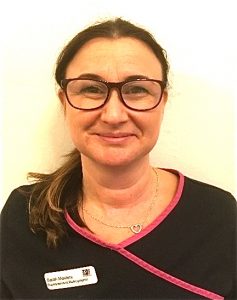Sarah Masters
Imaging Services Manager & Superintendent Radiographer
The Birmingham Upright MRI Centre
Who or what inspired you to pursue a career as a Radiographer?
My parents told me that from a small age I was always interested in ‘blood and gore’. During a visit to A&E for my sister, I apparently asked if I could keep a man’s ear if it fell off. From this point I think I was always destined to work in a healthcare setting of some description!
How did you qualify as a Radiographer?
After school I went to college to become a Medical Secretary and did that job for 5 years. As much as I enjoyed it, I wanted more of a patient facing role, and started looking around the hospital for a different career. Radiography stood out. I therefore went off to university as a mature student of 23 years of age to study ‘Diagnostic Radiography’.
What does your role involve?
I manage the Open Upright MRI Centre for Birmingham, and largely my role is running the Centre on a day to day basis. As we have an open magnet, the patients we attract are usually claustrophobic, extremely anxious or have associated medical issues that makes it impossible for them to lie flat for the traditional tunnel scanner. We are a very small team and endeavor to get every patient through their scan successfully and have them leave with a smile on their face.
Describe a typical working day in the Upright MRI Centre.
Since joining InHealth, and since the pandemic began, we have become extremely busy. We do see less patients than in a standard MRI department though, because we allow extra time to talk to our patients to allay their fears and our sequences also take a little longer. On a standard day we can scan around 9 to 10 areas. Covid 19 has made our lives a little difficult with PPE changes and clean downs between examinations, but more patients than ever our benefitting from our service.
What are the values that drive you?
Each patient is different. Each patient has their own fears and to that patient, those fears are very real. Each patient should be treated as you would like someone you love to be treated. Be empathetic to your patients. In this job, half the battle of getting your patient through their scan is done in the waiting room when you first engage with them. It is so important that your patient feels listened to and trusts you to take care of them.
What is the most challenging part of your role?
We never know what the next challenge will be. Our patients are definitely not ‘routine’. They come in all shapes and sizes with different levels of mobility. It can be a challenge to find a position the can be scanned in successfully, although adapting the scanner and technique can also be the most interesting part of the job too.
What is the most rewarding part of your job?
Seeing patients leave with a smile on their face. We often have patients that have a story as to why they have become claustrophobic or anxious. We have scanned patients who have been in very serious accidents, or been assaulted, or punished as children or have other reasons to anxious in enclosed spaces.
It is the most rewarding feeling, getting a patient through their MRI scan, when they have had several failed attempts in conventional tube scanners.
What is your secret talent (that nobody knows) or something that has made you smile recently?
During lockdown I set myself a mission to grow my own veg for Christmas dinner. Did well on most things but my parsnips either look angry or rude!



